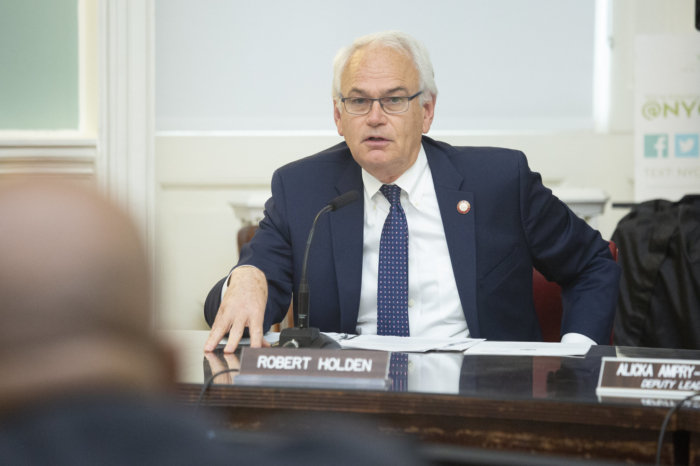By Tom Momberg
The city Department for the Aging gave up $3 million of its operating budget, based on efficiency savings that the commissioner was asked to identify, but Councilman Paul Vallone (D-Bayside) said it is evident from the services being cut that Mayor Bill de Blasio is not responding to the growing needs of seniors in the city.
Vallone, of the Council Committee on the Aging, and committee chair Margaret Chin (D-Manhattan) grilled DFTA Commissioner Donna Corrado about the cuts, asking her to reveal how the cuts would be made up for in her agency’s budget during an executive budget hearing.
“In just 10 years, the population of seniors in this city will increase by 50 percent. And this budget didn’t go up by a dollar. If that’s not a cut, I don’t know what is,” Vallone said during the hearing.
Chin said the committee had challenged de Blasio to come up with a budget line for DFTA that was fiscally responsible, progressive and honest.
“It is clear from looking at the agency’s budget, that the administration did not meet that challenge,” she said.
DFTA’s budget was increased for geriatric mental health for seniors and delivered-meal programs. But with a total budget of $269 million, DFTA is short $3 million from the amounts identified as a baseline last fiscal year.
Vallone and Chin said they were disappointed to see a $400,000 cut to social adult day care as well as the remainder of the loss that was to the city’s senior centers and programming.
“We are going into our final month with big gaps, and we are really going to need the administration to step up and help us address these gaps,” Chin said. “We are talking about our city’s most vulnerable population.”
Despite earlier budget negotiations, when the committee was promised a $2 million request-for-proposal for programs to combat elder abuse, the RFPs went out at $800,000. And Chin said the committee had identified the need for an additional $4.3 million for senior center operations, which also was not included in the executive budget.
But there is a historical context behind why DFTA increases were not included in the executive budget .
“I think that has to do with some historical ways that programs and contracts have been procured in the past,” Corrado said to Chin. “I know the baseline funding that was one way that helped the situation a great deal, but we are moving in a direction on which it’s not necessarily contingent.”
Corrado said the baseline is no longer a good measure, because the needs for aging services are not only growing, they are changing.
She said several programs are starting to be accepted by Medicare and have procured other sources of funding. But where needs are changing, such as in geriatric mental health, Corrado said the $1.4 million allotted is small, but will help DFTA carefully design a program that will run efficiently. She said there is no need for more funding until specifics are worked out.
There are roughly 2,000 city residents who have been waitlisted for senior case management, and 500 waitlisted for home care.
Corrado said her department is allocating resources to manage those waitlisted, and that she is still negotiating funding with de Blasio’s office and the city Office of Management and Budget.
“It’s time for Mayor de Blasio to stop talking about helping seniors and start taking action by providing the funding DFTA needs to get the job done,” Vallone and Chin said in a joint statement.

































